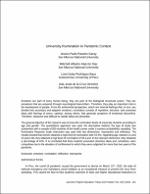| dc.contributor.author | Palacios Garay, Jessica Paola | |
| dc.contributor.author | Alarcón Diaz, Mitchell Alberto | |
| dc.contributor.author | Rodríguez Baca, Liset Sulay | |
| dc.contributor.author | De la Cruz Ordóñez, Ada Justa | |
| dc.date.accessioned | 2024-10-31T22:16:19Z | |
| dc.date.available | 2024-10-31T22:16:19Z | |
| dc.date.issued | 2023 | |
| dc.identifier.uri | https://hdl.handle.net/20.500.13067/3454 | |
| dc.description.abstract | Emotions are part of every human being; they are part of the biological structural system. They are sensations that are acquired through neurological transmitters. Therefore, they play an important role in the development of people. From the sentimental perspective, which are internal feelings that, in turn, are divided into secondary and adaptive emotions, rumination consists of repetitive, intrusive, and unwanted ideas with feelings of worry, sadness, among others, that generate symptoms of emotional discomfort. Therefore, obsessive and difficult to handle ideas are presented.The general objective of the research was to know the rumination levels of university students according to age and gender. The quantitative approach was used, the descriptive method, the type of study was substantive with a sample of 850 students of the health career under a random probabilistic sampling. The Ruminative Response Scale instrument was used with two dimensions: reproaches and reflection. The results showed that women obtained a high level of rumination with 44.4%; regarding age, between 21 and 23 years old, they obtained a high level of rumination of 39.4 and, in the reproach dimension, they obtained a percentage of 42%. It is concluded that these students presented obsessive ideas and, sometimes, were compulsive due to the situation of confinement to which they were subjected for more than two years of the pandemic. | es_PE |
| dc.format | application/pdf | es_PE |
| dc.language.iso | spa | es_PE |
| dc.publisher | Article Gateway | es_PE |
| dc.rights | info:eu-repo/semantics/openAccess | es_PE |
| dc.rights.uri | https://creativecommons.org/licenses/by-nc-nd/4.0/ | es_PE |
| dc.source | AUTONOMA | es_PE |
| dc.subject | Emotions | es_PE |
| dc.subject | Rumination | es_PE |
| dc.subject | Reflection | es_PE |
| dc.subject | Reproaches | es_PE |
| dc.title | University Rumination in Pandemic Context | es_PE |
| dc.type | info:eu-repo/semantics/article | es_PE |
| dc.identifier.journal | Journal of Higher Education Theory and Practice | es_PE |
| dc.identifier.doi | https://doi.org/10.33423/jhetp.v23i7.6023 | es_PE |
| dc.subject.ocde | https://purl.org/pe-repo/ocde/ford#2.02.04 | es_PE |
| dc.source.volume | 23 | es_PE |
| dc.source.issue | 7 | es_PE |
| dc.source.beginpage | 191 | es_PE |
| dc.source.endpage | 199 | es_PE |


